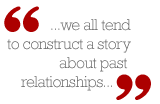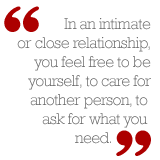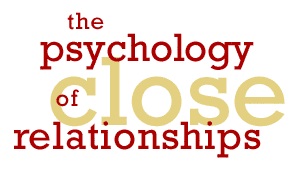|









|
Facts vs. Hype
Have you and a significant other (relationship science's
term for a romantic partner) ever been separated by time or distance -- say, parting for summer vacation when you were at school? Before
the separation you naturally wonder what will happen: Will absence
make the heart grow fonder? Or will it be a case of "out of sight,
out of mind"?
Both proverbs offer "wisdom" but they contradict each other: how do
you know which to believe? This is where research comes in, sorting
good advice from bad. In this case, research has suggested that both
sayings are true -- but under difference circumstances. "Absence makes
the heart grow fonder" when partners have already established a mutual
commitment. Without such a shared understanding and a pledge to stay
together, however, "out of sight" is likely to mean "out of mind,"
and a weakening or ending of the relationship.
Without science and fact-checking, much of what we "know" about relationships
can turn out to be mere mythology or bad advice. Relationships are
important to us, so we might even consider cliches in our search for
guidance. Yet, as important as closeness is to human well-being, all
the information you will find in our online series is the product
of research, not the interesting, "anecdotal" accounts we all get
from our friends or some of the self-help titles at the local bookstore.
"Oh, I had a boyfriend/girlfriend
like that once... Be careful."
Or, "C'mon, man, you know how women are. Like the book says, they're
from Venus. Only interested in love and romance. Don't try to
tell her what you're worried about. You'll turn her off."
In fact, research shows that sharing fears and other
personal feelings brings people closer, but the second exchange, overheard
in a coffeehouse, while bad advice, tells us something important:
As important as closeness is to human well-being, few of us feel
completely successful in intimacy. We seek partners, we seek solutions
to conflict and seek to know the secrets of harmonious relations
with those we have found. This is the paradox of the psychology
of CRs: important and natural as intimacy is in our lives, it can
be elusive and difficult to achieve. As a result, most of us, whatever
our relationship status, remain curious about closeness, even as
we are motivated to forge stronger, more enduring connections with
others.
Our friends and the popular media often do provide useful information.
So how can you know whom to believe and what to reject? That ability
to discriminate, to be an educated, critical consumer of information,
is one of the goals of this seminar series. The information offered here
is based on scientific studies and observations, not myth nor fantasy.
Some writers offer only stylish opinions, designed to sell, not
to represent the state of the science. The more you know of valid
information and reliable research, the more readily you will distinguish
the useful sources from the junk reading. The material in our seminar series
will get you started and help you think about relationships in a
more informed way and help you think about and improve your own
relationship skills.
We will even be including interviews with current
researchers to find out what they're working on now. For example,
this week we will hear about psychologist John Harvey's work on
minding and relationship loss. Did you know that we all tend to construct
a story about past relationships? The content of this story can
be very helpful to a person who has lost a relationship, whether
due to death, divorce or drifting apart, recover and go forward..
John and I are also co-authors of Odyssey
of the Heart: Close Relationships in the 21st Century.
The Care and Feeding of Close Relationships
To help give you a chance to think about your ideas and assumptions about relationships, in each session you will find some questionnaires and
self-assessments. Knowing your own tendencies in close relationships -- for example, pushing or pulling away when things are not going well -- can be an important step to improving them.
I will also recommend resources to consult so that you can "follow
along" with the course in other published materials and pursue
some topics further on your own. Some of what we offer here can
be applied readily to your own relationships, like an effective
advice column. But this is not therapy; it is a course of instruction
and study. No single research finding or lesson will apply successfully
to every life. Complex problems don't have simple solutions. One
size does not fit all!
What you derive from this Web seminar series depends on what you seek and what you put into the quest. It's intended
to be as intriguing as a magazine article -- and, we intend, more
reliable, accurate and useful. This first session emphasizes
a point that may not need emphasis, especially since you are already
reading this far: Relationships matter. And so does their "care
and feeding." With effort and intelligence, intimacy can be an experience
of both mystery and enlightenment.

Deep, personal relationships are central to how you define yourself,
and to your experiences and actions. A relationship with a very
close friend, romantic partner, family member or spouse affects
how you remember the past, experience your present and anticipate
your future. At this extreme are relationships we define as "intimate."
Intimacy refers to a distinctively close level of communication
between two people. Intimacy may be reflected in confiding or candid
talk; meaningful shared silences; mutually enjoyed activities; or
of course in sexual interaction. But "intimacy" is not a synonym
for sex -- rather, it should suggest the idea that sex is potentially
a unique type of communication. All these examples are forms of
close, personal relating -- what relationship scientists mean by intimacy.
In an intimate or close relationship, you feel free to be yourself,
to care for another person, to ask for what you need. These are
the relationships that contribute to our happiness -- or, when they
go wrong or fail, to our misery.
This seminar series on the psychology of CRs will examine the intimate end of the spectrum. Most relationships
psychologists define a close relationship as one in which people
have the following distinctive experiences:
- They know each other well.
- They care about each other.
- They depend on each other.
- They share their lives, thinking of themselves as “us.”
- They trust each other to be honest and fair.
- They maintain a commitment to each other.
A tall order? Certainly not every close relationship
succeeds in every one of these qualities all the time. Elements
might be missing in a particular partnership that is otherwise satisfactory
to both persons. And no two successful CRs look alike: there are
successful friendships, love affairs, marriages and cohabitating
partnerships. But despite the many shapes and sizes, the best relationships
seem to be the ones that reflect all these goals.

|




